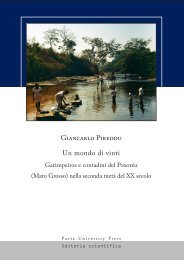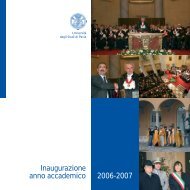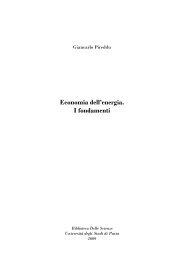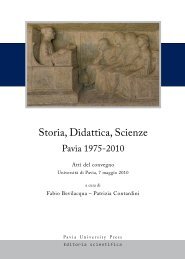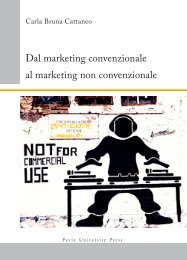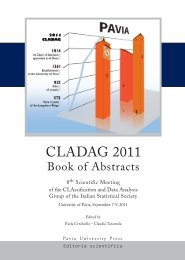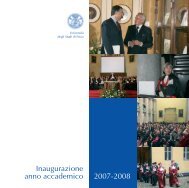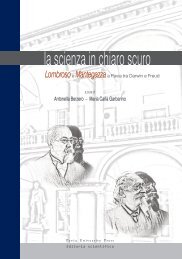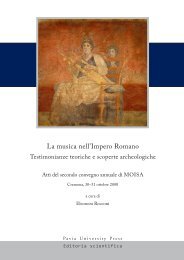Musica che affronta il silenzio - Scritti su Toru Takemitsu - Pavia ...
Musica che affronta il silenzio - Scritti su Toru Takemitsu - Pavia ...
Musica che affronta il silenzio - Scritti su Toru Takemitsu - Pavia ...
You also want an ePaper? Increase the reach of your titles
YUMPU automatically turns print PDFs into web optimized ePapers that Google loves.
Music Facing Up to S<strong>il</strong>ence. Writings on Tru Takemit<strong>su</strong><br />
1957, had practically vanished into oblivion). 2 In a Japanese account published in 1959 of<br />
Stravinsky’s visit to Tokyo we learn that, after listening to Takemit<strong>su</strong>’s Requiem, the grand<br />
old man of European music said: ‘This is good music, a very impressive and intense music’.<br />
3 In all likelihood Stravinsky’s appreciation of the Requiem derived from some sort of<br />
self-recognition on account of their joint affinity with Debussy, whose music is so evident<br />
in the harmonic colouring of the Requiem. (At the same time one cannot exclude the relevance<br />
of some explicit allusions to compositional procedures typical of the Second<br />
Viennese School – <strong>su</strong>ch as mirroring effects and inversions – which Stravinsky himself had<br />
experimented with in the second half of the 1950s).<br />
The circumstances of this favourable ‘meeting’, which for Takemit<strong>su</strong> constituted a<br />
notable testimonial for his future <strong>su</strong>ccess, have been described in many accounts written<br />
by and on Takemit<strong>su</strong>. One of the most deta<strong>il</strong>ed firsthand accounts is to be found in an<br />
interview he gave in 1988, which contains precious information on his contemporary<br />
tastes and further contacts with the Western avant-gardes:<br />
The Requiem for Strings. [Stravinsky] heard it by accident because, when he was<br />
in Tokyo [...] he asked to listen new Japanese music. The radio stations arranged<br />
it. My music was not <strong>su</strong>pposed to be played, but by chance someone played some<br />
and Stravinsky said, ‘Please, keep going’. He listened to my music along with<br />
many other pieces. After that he had a press conference and he mentioned only my<br />
name. Then he invited me to lunch. I was nervous because he is <strong>su</strong>ch a great master.<br />
Even at that time I didn’t like his music so much, though of course I had great<br />
respect for it – and he is <strong>su</strong>ch a great or<strong>che</strong>strator. Anyway, I met him. First impression:<br />
we shook hands.... his hand... so big, and very soft, like marshmallow.<br />
For me, it is unforgettable. After that he returned to the United States and perhaps<br />
he spoke about my music to Aaron Copland or something, so I got a commission<br />
from the Koussevitsky Foundation. Then I wrote a piece called Dorian Horizon.<br />
(Takemit<strong>su</strong> 1989b: 206-207) 4<br />
The work Takemit<strong>su</strong> refers to, composed in 1964 and published in 1966, had its first<br />
performance in 1967 in San Francisco, with Copland conducting. 5 This fact was particularly<br />
significant for the Japanese composer because Aaron Copland had figured in<br />
his artistic development well before the visit of Stravinsky to Japan, specifically in the<br />
second half of the 1940s, when Takemit<strong>su</strong> had his first contact with American music.<br />
2<br />
Cf. in this context also Burt (2001: 50 ff.). On p. 51 the author notes that the first bars of the Requiem resemble<br />
Samuel Barber’s Adagio for strings, and wonders whether Takemit<strong>su</strong> may have heard Barber’s work on the<br />
radio of the American Center for Information and Education in Tokyo.<br />
3<br />
Reports published in Miyamoto (1996: 121) and in Ohtake (1993: 6).<br />
4<br />
Passage also cited in Miyamoto (1996: 121). Concerning Dorian Horizon see among other articles<br />
Galliano (2002: 30-35).<br />
5<br />
Cf. in this respect also Ohtake (1993: 8).<br />
161



